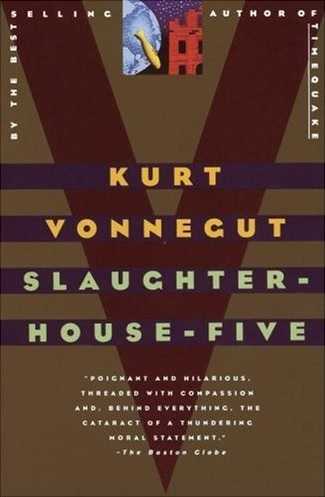I have a rough list of books I've been meaning to eventually read, mostly classics and famous literature. It's not in any particular order but if it was, Slaughter-House-Five would be right near the top.
Well, I finally got around to it and can say it's been a long while since I last read a novel so conversational, so satirical, that centers around such heavy topics as war and death. It took me a few attempts to get properly into it.
Reading it in 2023, I tried to imagine the initial reception upon its publication. After all, 1969 wasn't that long after the end of the war. Would the public have been less 'anti-war' than today?
Or, in the immediate aftermath of WWII, would they perhaps have been even more 'anti-war' than we are now. It's worrying that I can't say for certain.
So it goes.
Slaughter-House-Five, by Kurt Vonnegut
- Publisher: Delacorte
- Publication Date: March 31, 1969
- ISBN: 0-385-31208-3
- Genre: Science-Fiction, Satire, War

Wikipedia Says:
The story is told in a non-linear order by an unreliable narrator (he begins the novel by telling the reader, "All this happened, more or less"). Events become clear(er) through flashbacks and descriptions of his time travel experiences.
In the first chapter, the narrator describes his writing of the book, his experiences as a University of Chicago anthropology student and a Chicago City News Bureau correspondent, his research on the Children's Crusade and the history of Dresden, and his visit to Cold War-era Europe with his wartime friend Bernard V. O'Hare.
He then writes about Billy Pilgrim, an American man from the fictional town of Ilium, New York, who believes that he was held at one time in an alien zoo on a planet he calls Tralfamadore, and that he has experienced time travel.
Through non-chronological storytelling, other parts of Billy's life are told throughout the book.
The reviews of Slaughterhouse-Five have been largely positive since the March 31, 1969 review in the New York Times stated: "you'll either love it, or push it back in the science-fiction corner." It was Vonnegut's first novel to become a bestseller, staying on the New York Times bestseller list for sixteen weeks and peaking at No. 4.
In 1970, Slaughterhouse-Five was nominated for best-novel Nebula and Hugo Awards. It lost both to The Left Hand of Darkness by Ursula K. Le Guin.
It has since been widely regarded as a classic anti-war novel, and has appeared in Time's list of the 100 best English-language novels written since 1923.